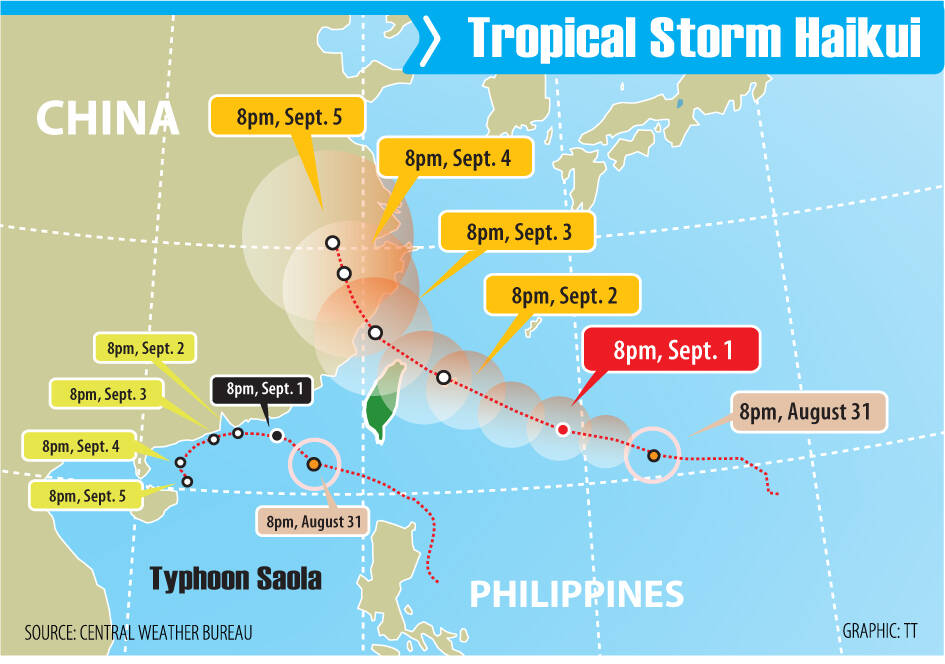Tropical Storm Haikui is expected to bring heavy rain to Taiwan as it passes north of the country and strengthens into a typhoon, the Central Weather Bureau (CWB) said yesterday.
At 8am yesterday, Haikui was 1,240km east-southeast of Taipei, moving west-northwest at 21kph, CWB data showed.
With a radius of 120km, Haikui was packing maximum sustained winds of 108kph, with gusts of up to 136.8kph, the data showed.

CWB forecaster Wu Wang-hua (伍婉華) told reporters at about noon that the storm was likely to strengthen into a typhoon as it moved north.
It would be closest to Taiwan today and tomorrow on its current path, Wu said.
However, if it does not move as far north as projected, it could significantly affect Taiwan, she said.
Regardless of its path, Haikui is likely to bring heavy rain to parts of Taiwan, she said, adding that the CWB might issue a sea warning today.
Meanwhile, Super Typhoon Saola was 350km west-southwest of Taiwan at 2pm yesterday, moving across the South China Sea toward China, CWB data showed.
Parts of Taiwan are likely to have heavy rain today as the peripheries of both storms affect the nation, Wu said.
CWB lifted its sea warning for Typhoon Saola at 2:30pm yesterday and its land warning at 11:30pm on Wednesday as the storm weakened and its storm circle decreased.

A Vietnamese migrant worker on Thursday won the NT$12 million (US$383,590) jackpot on a scratch-off lottery ticket she bought from a lottery shop in Changhua County’s Puyan Township (埔鹽), Taiwan Lottery Co said yesterday. The lottery winner, who is in her 30s and married, said she would continue to work in Taiwan and send her winnings to her family in Vietnam to improve their life. More Taiwanese and migrant workers have flocked to the lottery shop on Sec 2 of Jhangshuei Road (彰水路) to share in the luck. The shop owner, surnamed Chen (陳), said that his shop has been open for just

Global bodies should stop excluding Taiwan for political reasons, President William Lai (賴清德) told Pope Francis in a letter, adding that he agrees war has no winners. The Vatican is one of only 12 countries to retain formal diplomatic ties with Taiwan, and Taipei has watched with concern efforts by Beijing and the Holy See to improve ties. In October, the Vatican and China extended an accord on the appointment of Catholic bishops in China for four years, pointing to a new level of trust between the two parties. Lai, writing to the pope in response to the pontiff’s message on Jan. 1’s

TAKE BREAKS: A woman developed cystitis by refusing to get up to use the bathroom while playing mahjong for fear of disturbing her winning streak, a doctor said People should stand up and move around often while traveling or playing mahjong during the Lunar New Year holiday, as prolonged sitting can lead to cystitis or hemorrhoids, doctors said. Yuan’s General Hospital urologist Lee Tsung-hsi (李宗熹) said that he treated a 63-year-old woman surnamed Chao (趙) who had been sitting motionless and holding off going to the bathroom, increasing her risk of bladder infection. Chao would drink beverages and not urinate for several hours while playing mahjong with friends and family, especially when she was on a winning streak, afraid that using the bathroom would ruin her luck, he said. She had

MUST REMAIN FREE: A Chinese takeover of Taiwan would lead to a global conflict, and if the nation blows up, the world’s factories would fall in a week, a minister said Taiwan is like Prague in 1938 facing Adolf Hitler; only if Taiwan remains free and democratic would the world be safe, Deputy Minister of Foreign Affairs Francois Wu (吳志中) said in an interview with Italian newspaper Corriere della Sera. The ministry on Saturday said Corriere della Sera is one of Italy’s oldest and most read newspapers, frequently covers European economic and political issues, and that Wu agreed to an interview with the paper’s senior political analyst Massimo Franco in Taipei on Jan. 3. The interview was published on Jan. 26 with the title “Taiwan like Prague in 1938 with Hitler,” the ministry